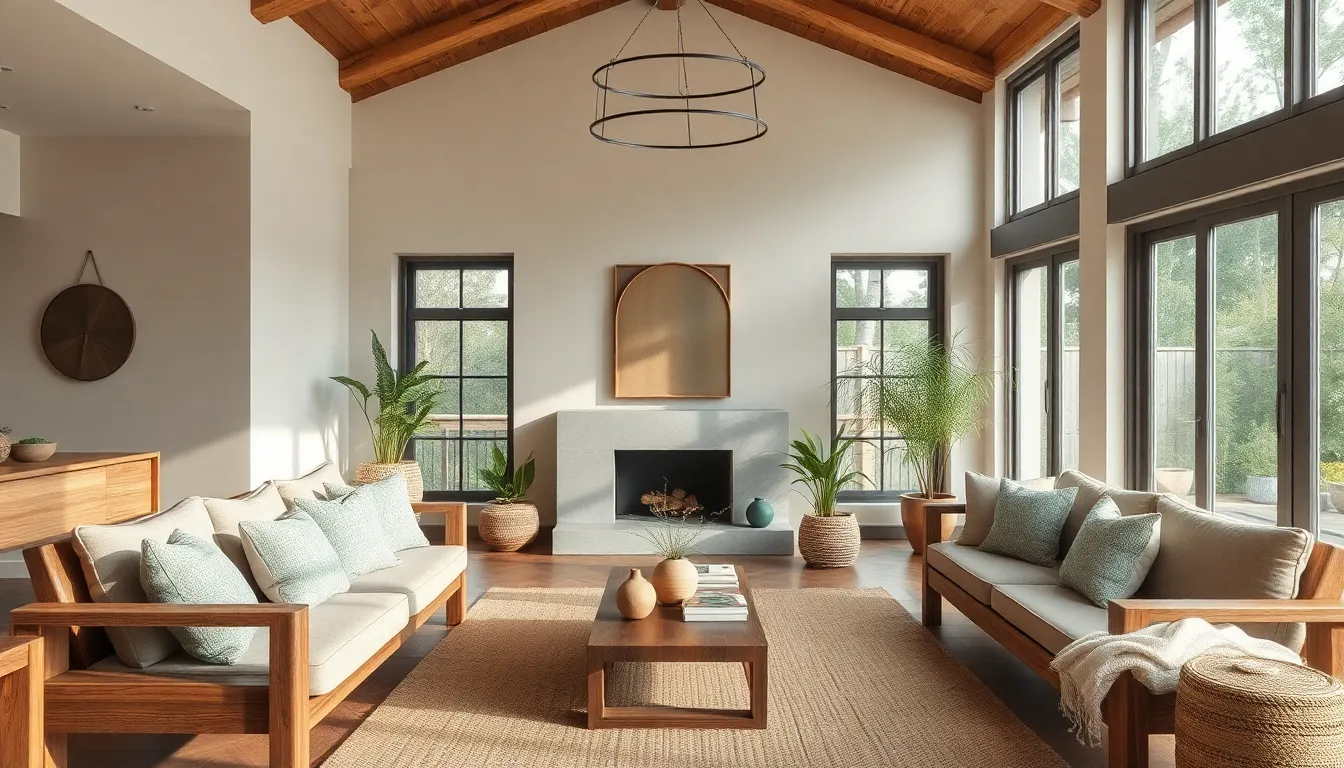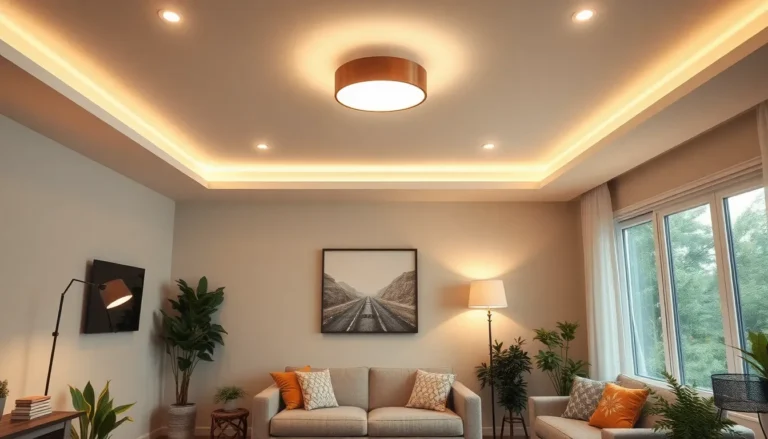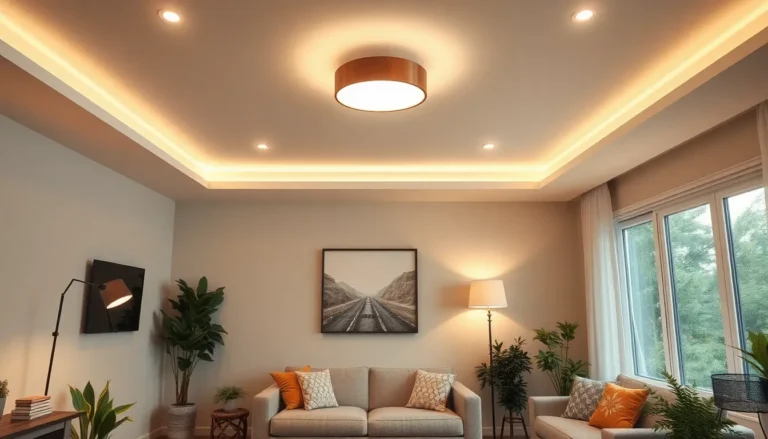Table of Contents
ToggleImagine a world where luxury doesn’t come at the expense of Mother Earth. Luxe sustainable living is all about embracing high-end comforts while keeping the planet happy. It’s like having your cake and eating it too—except this cake is made from organic, locally sourced ingredients and served on a biodegradable plate. Who says you can’t indulge in life’s finer things while being eco-friendly?
Understanding Luxe Sustainable Living
Luxe sustainable living merges elegance with eco-consciousness. This approach allows individuals to relish in luxurious experiences while prioritizing the planet.
Definition and Concept
Luxe sustainable living encompasses high-end lifestyles that embrace environmental responsibility. It integrates premium quality with sustainable materials and practices. Organic fabrics, energy-efficient appliances, and local products often appear in this lifestyle. By choosing these elements, consumers indulge in comfort without compromising ethical considerations. Every decision reflects an awareness of environmental impact, demonstrating that luxury can align with sustainable practices.
Importance in Today’s Society
Today’s society increasingly values sustainable choices. Consumers seek brands that prioritize eco-friendliness alongside luxury. As climate change and environmental degradation escalate, the demand for sustainable options grows. Individuals express preferences for products that minimize waste and promote social responsibility. Embracing luxe sustainable living empowers consumers to make impactful decisions. This lifestyle not only enhances personal well-being but also contributes to a healthier planet for future generations.
Key Elements of Luxe Sustainable Living

Luxe sustainable living relies on specific elements that merge elegance with eco-friendliness. Key aspects include sustainable materials and ethical production practices.
Sustainable Materials and Design
Sustainable materials serve as the foundation for luxe design. Organic fabrics, like linen and cotton, enhance comfort while reducing environmental impact. Recycled materials, such as reclaimed wood and glass, add sophistication to interiors. Biodegradable options, including bamboo and cork, offer beautiful alternatives to traditional materials. Innovative designs prioritize longevity, minimizing waste and the need for replacements. Investing in high-quality, sustainable goods supports artisans and reduces carbon footprints.
Ethical Production Practices
Ethical production practices emphasize responsibility in manufacturing. Fair trade certification ensures workers receive fair wages and work in safe conditions. Local sourcing diminishes transportation emissions, supporting regional economies. Transparency in supply chains builds consumer trust and fosters accountability. Brands that prioritize sustainability engage in environmentally friendly processes, such as water conservation and waste reduction. Choosing ethical luxury ultimately strengthens communities and encourages sustainable growth.
Benefits of Luxe Sustainable Living
Luxe sustainable living offers numerous advantages that center around environmental consciousness and personal health. Sustainable habits paired with luxury elevate lifestyles while fostering positive change.
Environmental Impact
Luxe sustainable living significantly reduces carbon footprints. By choosing eco-friendly materials like organic cotton and reclaimed wood, individuals minimize waste and resource depletion. Solar panels and energy-efficient appliances enhance energy conservation, leading to lower utility bills. Sustainable practices promote biodiversity, benefiting local ecosystems. Brands committed to ethical production help preserve natural environments through responsible sourcing. Collective efforts in adopting this lifestyle can result in a measurable decrease in ecological harm, contributing to a healthier planet over time.
Health and Wellbeing
Luxe sustainable living directly influences personal health. High-quality, organic materials promote better indoor air quality and reduce exposure to toxins. Stress levels decrease when individuals embrace environments designed with sustainable practices, such as using natural light and incorporating plants. Choosing ethical products also supports mental well-being by ensuring fair labor practices and contributing to community development. Investing in luxurious, eco-conscious goods cultivates a sense of fulfillment, connecting individuals to their values of health and sustainability. Through mindful consumption, personal wellness improves alongside environmental welfare, creating a holistic lifestyle approach.
Trends in Luxe Sustainable Living
Current trends in luxe sustainable living reveal a distinct shift towards eco-consciousness in consumer choices. This movement highlights the desirability of eco-friendly products that combine elegance with environmental responsibility.
Eco-Friendly Products
Consumer preferences increasingly lean toward eco-friendly products crafted from sustainable materials like organic cotton, bamboo, and recycled plastics. Many brands now offer luxurious home goods and fashion items that not only boast high quality but also minimize environmental impact. These products often use non-toxic finishes and dyes, ensuring safety for users and ecosystems alike. Additionally, packaging innovations focus on biodegradable and compostable options, reducing waste significantly. As consumers opt for these items, they contribute to a market that values ethical practices and sustainable sourcing.
Innovations in Sustainable Luxury Brands
Innovations within sustainable luxury brands push boundaries and redefine industry standards. Many companies embrace cutting-edge technologies that enhance product life cycles and reduce carbon footprints. For instance, 3D printing techniques allow for bespoke designs while minimizing material waste. Other brands focus on integrating plant-based or reclaimed materials into their collections, showcasing creativity and commitment to sustainability. Collaborations between designers and environmental organizations also further promote awareness and education around eco-friendly practices. Consumers increasingly recognize these innovations as essential factors in their purchasing decisions, aligning luxury with a sense of purpose.
Challenges and Considerations
Luxe sustainable living presents certain challenges and considerations that influence its adoption. Understanding these factors is essential for those pursuing eco-conscious luxury.
Cost and Accessibility
Luxury sustainable products often come with a higher price tag compared to conventional options. Premium materials and ethical manufacturing processes contribute to increased costs. Individuals may face difficulty accessing these products, particularly in areas with limited availability of sustainable brands. Choices may be restricted, creating challenges for those wishing to embrace this lifestyle. Additionally, consumers often encounter small selections that enhance the luxury experience while ensuring environmental responsibility. Balancing cost with personal values remains a key consideration when pursuing luxe sustainable living.
Consumer Awareness and Education
Consumer awareness plays a crucial role in the success of luxe sustainable living. Many individuals lack knowledge about the benefits of sustainable products and practices. Education about sustainable materials, ethical certifications, and their positive impacts is vital for informed decision-making. Without this understanding, shoppers may perceive sustainable options as less desirable or unfamiliar. Brands also carry a responsibility to communicate their eco-friendly practices clearly. Through transparent messaging, educational campaigns, and collaborations with sustainability organizations, companies can elevate consumer awareness and drive demand for luxurious, yet responsible, choices.
Luxe sustainable living stands as a testament to the possibility of enjoying high-end comforts while nurturing the planet. By choosing eco-friendly materials and ethical production methods, individuals can indulge in luxury that aligns with their values.
This lifestyle not only enhances personal well-being but also contributes to a healthier environment for future generations. As consumer awareness grows, the demand for sustainable luxury continues to rise, encouraging brands to innovate and prioritize eco-conscious practices.
Ultimately, embracing this approach allows individuals to make meaningful choices that reflect both elegance and responsibility, paving the way for a more sustainable future.







